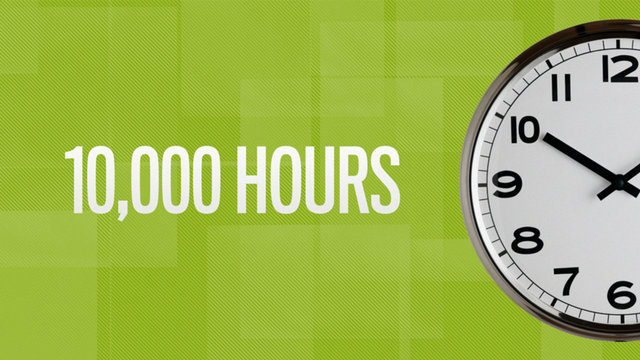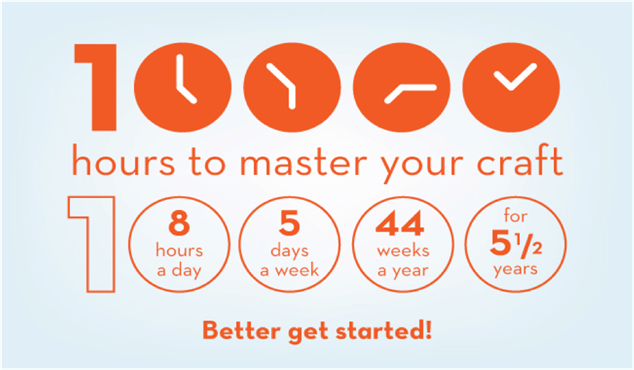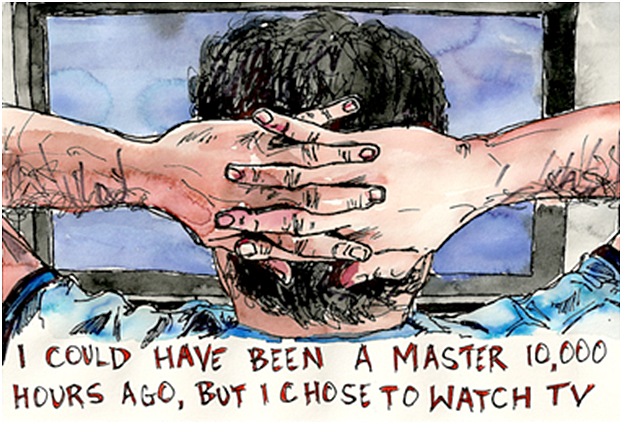
When my son had some friends over for lunch one day, we had a talk about what they did in their spare time. This question always interested me, because my son, Tsoof, never had any spare time in high school. In the last year of high school, he started at 7am and finished around 5pm most days of the week. Since he was in bed by 8:30-9:00pm, there was not much time left for other things.
I was very surprised when some of them told me they spent 3-4 hours during weekdays on Facebook, and on the weekend, they even got to 6-8 hours.
I was shocked!
It made me realize why Tsoof was in a different state to them. Back then, he had no Facebook account, he was a student leader, he was taking a university course, he had 8 before-school and after-school activities every week and he was an excellent student.
Experts in Facebook
I told them that if they understood the 10,000-hour rule, they would see that they were gearing up to be experts in … Facebook.
 Malcolm Gladwell presented the 10,000-hour rule in his book Outliers: The Story of Success. Studying experts in various fields, Gladwell claimed that every person could reach greatness in any field by practicing their skills for 10,000 hours.
Malcolm Gladwell presented the 10,000-hour rule in his book Outliers: The Story of Success. Studying experts in various fields, Gladwell claimed that every person could reach greatness in any field by practicing their skills for 10,000 hours.
Did you get that?
If you want to be great at something, you must practice it for 10,000 hours, and the best time to start your expert training is right now, because 20 hours a week over 10 years will make you expert at whatever you want!
Most people think that those experts succeeded because they had special abilities, but this is just an excuse for not to starting to practice, because 10,000 hours just seems overwhelming. No expert was born an expert. They did the hours, failed numerous times and improved their skills for years before they became experts.
When I talked to those teens about the 10,000-hour rule, they thought they had plenty of time. However, in the previous 3 years, they had already spent 3 out of those 10 years becoming Facebook experts. The problem was that being a Facebook expert is not very useful.
Practice isn’t the thing you do once you’re good. It’s the thing you do that makes you good
Malcolm Gladwell
Hobbies are a good start for the 10,000 hours or training
Hobbies are a great way to start your expert training even if you end up not pursuing your hobby as a profession. My son, Tsoof, did not know he would be a musician when he started playing percussion at the age of 4. It was a hobby. As his parents, we were happy for it to stay a hobby and we never pushed him to be the best, to win competitions or “take it seriously”, only to keep doing what he enjoyed. He reached his 10,000 hours when he was 16, while having fun the whole time.
Training on related things can add up hours and interests
During those years, he did many other things besides playing percussion, which contributed greatly to his musicianship.
On the way, he played guitar, which seems unrelated, but contributed to his musicality. He sang in a choir, which was very important to his knowledge of music. He danced, which became relevant when he wrote body-percussion compositions and gave him confidence to perform. He took a composition course, which improved his understanding of music. He did drama and participated in school plays and musicals, which built his stage presence, his emotional vocabulary and his improvisation skills. Even his leadership position, as a school captain, contributed to his 10,000 hours, because since he was 16, he has led groups of players (older than he was) to play and perform his compositions.
Noff, my youngest daughter, is an artist at heart. She has been singing since she was 3. She has been dancing and doing art since she was 5. She has been doing drama since she was 8. She is 14 years old now and she is too young to decide what she wants to do in life, but she has lots of training and we are convinced that her skills and the joy she gets from developing them will contribute to who she will be in the future.
When the focus is on accumulating hours, many things can be part of your “training”, even if you do not make a profession out of them.
Follow the 10,000-hour rule early

The good thing about training to become an expert is that you do not have to be good from the beginning. You just have to follow the 10,000-hour rule and do it again and again until you become good.
When I studied Education, I was not an expert, only a learner. I had a huge advantage over my fellow students, because in my first year of college, I already started working in the education field, and I kept working all the way through. When other students had 400 hours of work experience, I already had about 4,000 (and I got paid for most of them). If I kept telling myself that I did not stand a chance when I compared myself to my expert teachers, I would never have started.
While most people take 10 years of work to become experts, I only needed 6 more. All those who start their training early have an advantage.
In the scheme of things, 10 years is not a long time. Only 20 hours a week are required to reach mastery. Some say that you can do it in 5 years if you dedicate 8 hours a day, 5 days a week.
Do the math. It is simple.

When you watch videos for 20 hours a week, sit in front of the TV or spend that time on Facebook or other social media, you will become expert at something that will not be useful for you in life. You can use the same time to give yourself an advantage.
You can be anything you want to be, just start by accumulating 10,000 hours starting … now!
Have a great time,
Ronit











